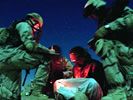Eye For Film >> Movies >> Taxi To The Dark Side (2007) Film Review
"One by one the terrorists are learning the value of American justice."
If the rhetoric is unmistakably that of George W Bush, one of the surprises of Taxi To The Dark Side is that it reaches something like the same conclusion as the President's soundbite (if not quite in the way that the words were originally intended).

We have already had Michael Moore caricaturing Bush as an incompetent fool in Fahrenheit 9/11 (2004), but Taxi To The Dark Side is an altogether more serious indictment of decisions taken by the Bush administration post-9/11. Resorting to neither cheap ridicule nor glib partisan point-scoring, this powerful documentary instead relies on well-selected testimonies, well-researched documentary evidence, and cogent, step-by-step reasoning to build its case that Bush's executive has ridden roughshod over the the US constitution, international law and the Geneva Convention in its deeply flawed pursuit of the 'War on Terror'. American justice is no longer what it used to be, and the lessons that others are learning from it are likely to have disastrous repercussions for us all.
In his earlier documentary Enron: The Smartest Guys in the Room (2005), Alex Gibney demonstrated his talent for collating difficult evidential materials into a careful and cogent argument, and here he uses the same skills to paint a devastating portrait of the US' treatment of detained terror suspects.
It starts and ends with the story of Dilawar, an unarmed Afghan taxi driver who, in late 2002, was wrongly arrested by local militiamen, handed over to the occupying forces, detained at Bagram Air Base, shackled and severely beaten by his captors over five days until his death (ruled to be "homicide" by the military's own investigator). Taxi To The Dark Side draws links between what happened to this entirely innocent man, the now well-attested cases of abuse at Abu Ghraib, and the judicial black hole at Guantanamo Bay, to suggest that Dilawar, far from falling prey to the wrongdoings of "a few bad apples" in the lower ranks at Bagram, was one victim (of many) of a deliberate post-9/11 shift in the way intelligence is gathered – a shift towards what Bush's Vice President Dick Cheney, one week after the Twin Towers came down, memorably termed "the dark side".
This is a thorough examination of how torture (or at least what anyone other than the current US administration would call torture) has come to be a standard weapon in the War on Terror. The film uncovers the history and evolution of the torture methods used (deprivation, stress positions, sexual humiliation, waterboarding), further detailing what physical and psychological effects this treatment has on detainees (the effects are not good), and how useful any intelligence extracted in this way is (unsurprisingly, not useful at all). Gibney even interviews a former FBI agent who helpfully offers alternatives methods of interrogation that, unlike torture, produce real results.
All of this is of great importance at a time when an unacceptable slipperiness has entered the definitions of what constitutes "cruel and inhuman" (and therefore illegal, under the Geneva Convention) punishment of detainees. Yet the film's biggest coup is in its attribution of responsibility. While only those below the rank of officer have ever been officially charged with prisoner abuse, Gibney follows a paper trail all the way up the chain of command to the Pentagon and the Executive. He demonstrates that such abuse is a matter of government policy – and even as Bush and his inner circle have sanctioned and signed off the generalised use of torture on so-called terrorist suspects, they have also repeatedly side-stepped the rule of law through legalistic obfuscation and the demolition of habeas corpus, they have energetically covered up their every mistake and, as their actions have come under closer scrutiny by the media, they have introduced legislation on the sly to immunise themselves – but not those under their command – against the charges of war crimes that are very likely to be brought against them in future.
In short, despite the calmly logical way in which it allows its revelations to unfold and accumulate, Taxi To The Dark Side is an angry powder-keg of a film, exploding the reactionary myth that under certain circumstances torture can be acceptable, serviceable or even necessary. On the contrary, the film shows how the Bush administration has systematically undermined every principle it claims to be defending – and, through highlighting the story of Dilawar and others, Gibney never loses sight of the human cost of such policies, and of the future troubles being stored up by victims and their communities.
Gibney's film, which won the Academy Award for Best Feature Documentary in 2008, may be an uncomfortable, bumpy ride, and may even take you to places you'd rather not go - but this Taxi offers a broad-ranging tour of Bush's disregard for the rule of law in the War on Terror, making it essential viewing for anyone interested in the depressing state of justice post-9/11.
Reviewed on: 09 Jun 2008



















